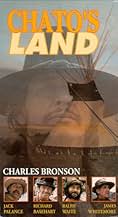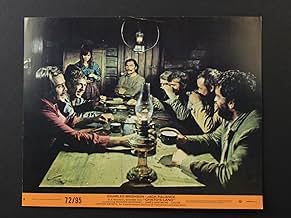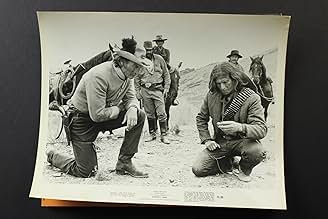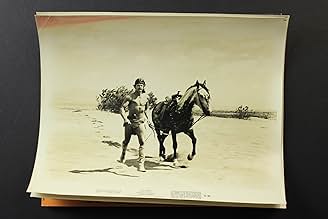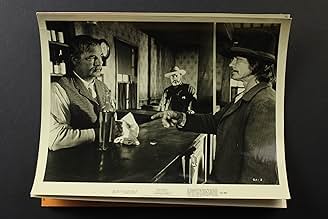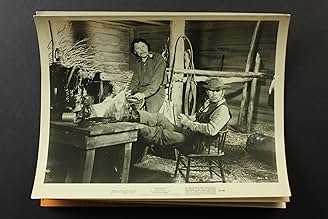IMDb RATING
6.6/10
6.9K
YOUR RATING
In 1870s New Mexico, a half-breed kills a bigoted sheriff in self-defense but the posse that eventually hunts him finds itself in dangerous territory.In 1870s New Mexico, a half-breed kills a bigoted sheriff in self-defense but the posse that eventually hunts him finds itself in dangerous territory.In 1870s New Mexico, a half-breed kills a bigoted sheriff in self-defense but the posse that eventually hunts him finds itself in dangerous territory.
- Director
- Writer
- All cast & crew
- Production, box office & more at IMDbPro
Featured reviews
Chato's Land was a pleasant surprise, due to its mixed reception and that the type of film that it falls under is not always my thing I was not expecting an awful lot. But seeing as the cast was a good one on paper I thought, why not? Chato's Land is not going to be for everybody, it's very gritty and violent(some of it being not for the faint-hearted, the most memorable of it actually being very brutal) and Michael Winner's films are the kind that will entertain some and not be others' cup of tea.
The film is a touch overlong and gets a bit draggy in spots, while the ending is rather abrupt and rushed- sure it was intended to be ambiguous but for me there was the feeling of uncertainty of how to end it- and the day-for-night lighting/shooting is awfully obvious. Jerry Fiedler's music score compliments the film well and dynamically orchestrated but could have had a more sweeping punch and with less of a TV series and workmanlike pace. However Chato's Land was a pretty good film, apart from the day-for-night it's reasonably well made with splendidly gritty scenery and handsome photography that suits the atmosphere. Chato's Land is also very intelligently scripted with some remarkably literate dialogue, the direction from Michael Winner is above competent at least pacing and technically-wise and the story mostly is well-paced and compelling.
In terms of action, that in Chato's Land is sparse but when it does appear it really does pack a punch. For an action/Western film, what was really impressive about Chato's Land was the way the characters are written. The characters here are very interesting and with plenty of layers, Captain Whitmore is a very multi-faceted character and perhaps the most multi-faceted role of Jack Palance's career. The great performances help(apart from for my tastes the hammy one of Richard Jordan), Charles Bronson has rarely looked better and brings a real commanding charisma every time he appears, very telling even when not saying very much. James Whitmore, Richard Basehart, Simon Oakland and Ralph Waite give solid support but best of all is Jack Palance, who is superb in one of his better and more layered performances.
Overall, far from perfect and not for everybody's tastebuds but a pretty good film. 7/10 Bethany Cox
The film is a touch overlong and gets a bit draggy in spots, while the ending is rather abrupt and rushed- sure it was intended to be ambiguous but for me there was the feeling of uncertainty of how to end it- and the day-for-night lighting/shooting is awfully obvious. Jerry Fiedler's music score compliments the film well and dynamically orchestrated but could have had a more sweeping punch and with less of a TV series and workmanlike pace. However Chato's Land was a pretty good film, apart from the day-for-night it's reasonably well made with splendidly gritty scenery and handsome photography that suits the atmosphere. Chato's Land is also very intelligently scripted with some remarkably literate dialogue, the direction from Michael Winner is above competent at least pacing and technically-wise and the story mostly is well-paced and compelling.
In terms of action, that in Chato's Land is sparse but when it does appear it really does pack a punch. For an action/Western film, what was really impressive about Chato's Land was the way the characters are written. The characters here are very interesting and with plenty of layers, Captain Whitmore is a very multi-faceted character and perhaps the most multi-faceted role of Jack Palance's career. The great performances help(apart from for my tastes the hammy one of Richard Jordan), Charles Bronson has rarely looked better and brings a real commanding charisma every time he appears, very telling even when not saying very much. James Whitmore, Richard Basehart, Simon Oakland and Ralph Waite give solid support but best of all is Jack Palance, who is superb in one of his better and more layered performances.
Overall, far from perfect and not for everybody's tastebuds but a pretty good film. 7/10 Bethany Cox
There's a little in-joke that's included in Pardon Chato's (Charles Bronson) only line spoken in English; and that occurs in about the second minute of this savagely entertaining story about vigilantism running amok somewhere in the Old West.
We see Chato, at the saloon bar, waiting to get his whiskey when in comes the local Marshall Endersby (Jacob Meade), looking to kill himself an uppity mestizo. So, here's the in-joke: just before the Marshall draws to shoot, Chato says: "Back off, lawman!" Then he spins quickly, shooting from the hip to kill the Marshall. It's a joke, because the director, Michael Winner, in 1971, had already filmed a story called Lawman (by the same screen writer, Gerald Wilson) in which a Marshall hunts down a group of men – relentlessly, mercilessly and legally. (Note that Lawman is more highly regarded, at IMDb, than Chato's Land.)
Anyway, the story of Chato is double joke: here, the Marshall is out of the picture (no pun intended) immediately, and the hunters – the Posse Commitatus, a mixed bunch of misfits headed up by either ex-Captain Whitmore (Jack Palance) or Jubal Hooker (Simon Oakland), depending on how the plot unfolds – become the hunted when Chato begins the task of killing them – relentlessly, mercilessly...but, illegally, in this story. Oh, Chato has the moral high ground, many would argue; but, objectively, any court would find him guilty of manslaughter at the very least. And, man, what a slaughter it is! But, this is the Old West, where just about anything goes.
The story has many antecedents (about which Winner and Wilson would have been well aware): The Bravados (1958) with Gregory Peck as the hunter; Hombre (1967) with Paul Newman as the despised mestizo; and Valdez is Coming (1971) with Burt Lancaster as the hunter, and a Mexican to boot. You could probably add to that list. This film adds to it, of course, as being just another take on the good, ol' American pastime of vigilantes racing off to git themselves a hangin' afore nightfall, if possible. In that regard and if you have seen it, you shouldn't miss watching the heartbreak in The Oxbow Incident (1943) with Henry Fonda, heading up an all-star cast, who tries to stop the west's favorite method of dispensing rough justice.
The best part about Chato's Land is the land: the stark, unforgiving country that Chato uses to his advantage. Winner makes good use of long, wide angle shots to emphasize the harsh, bleak landscape; but, his studied close-ups of the characters are often almost works of art. Of the cinematography, I can only complain of the lighting – a good lot of the shoot was completed in pseudo-darkness, using blue filters, no doubt, and was quite annoying at times. Editing is up to par, though, and Jerry Fielding's music is suitably moody – although, I could have done without the military-type snippets.
After speaking that one English line, Chato sticks to Apache, or is silent throughout, as he gets on with his task. So, it's nice to see a man happy in his work, and who doesn't bother us with useless talk.
Highly recommended for all fans of Bronson and Palance.
We see Chato, at the saloon bar, waiting to get his whiskey when in comes the local Marshall Endersby (Jacob Meade), looking to kill himself an uppity mestizo. So, here's the in-joke: just before the Marshall draws to shoot, Chato says: "Back off, lawman!" Then he spins quickly, shooting from the hip to kill the Marshall. It's a joke, because the director, Michael Winner, in 1971, had already filmed a story called Lawman (by the same screen writer, Gerald Wilson) in which a Marshall hunts down a group of men – relentlessly, mercilessly and legally. (Note that Lawman is more highly regarded, at IMDb, than Chato's Land.)
Anyway, the story of Chato is double joke: here, the Marshall is out of the picture (no pun intended) immediately, and the hunters – the Posse Commitatus, a mixed bunch of misfits headed up by either ex-Captain Whitmore (Jack Palance) or Jubal Hooker (Simon Oakland), depending on how the plot unfolds – become the hunted when Chato begins the task of killing them – relentlessly, mercilessly...but, illegally, in this story. Oh, Chato has the moral high ground, many would argue; but, objectively, any court would find him guilty of manslaughter at the very least. And, man, what a slaughter it is! But, this is the Old West, where just about anything goes.
The story has many antecedents (about which Winner and Wilson would have been well aware): The Bravados (1958) with Gregory Peck as the hunter; Hombre (1967) with Paul Newman as the despised mestizo; and Valdez is Coming (1971) with Burt Lancaster as the hunter, and a Mexican to boot. You could probably add to that list. This film adds to it, of course, as being just another take on the good, ol' American pastime of vigilantes racing off to git themselves a hangin' afore nightfall, if possible. In that regard and if you have seen it, you shouldn't miss watching the heartbreak in The Oxbow Incident (1943) with Henry Fonda, heading up an all-star cast, who tries to stop the west's favorite method of dispensing rough justice.
The best part about Chato's Land is the land: the stark, unforgiving country that Chato uses to his advantage. Winner makes good use of long, wide angle shots to emphasize the harsh, bleak landscape; but, his studied close-ups of the characters are often almost works of art. Of the cinematography, I can only complain of the lighting – a good lot of the shoot was completed in pseudo-darkness, using blue filters, no doubt, and was quite annoying at times. Editing is up to par, though, and Jerry Fielding's music is suitably moody – although, I could have done without the military-type snippets.
After speaking that one English line, Chato sticks to Apache, or is silent throughout, as he gets on with his task. So, it's nice to see a man happy in his work, and who doesn't bother us with useless talk.
Highly recommended for all fans of Bronson and Palance.
A laconic Apache is pursued by a posse to solve a sheriff's death , dead in self-defense showdown by Chato (Charles Bronson) . Stalking the misfit group who are allegedly to be chasing him , after they attack his woman and family . A veteran confederate officer (Jack Palance) leads the posse (Victor French , James Withmore , Lee Patterson) along with three brutal brothers (Richard Jordan , Simon Oakland , Ralph Waite). Chino struggles to maintain his livelihood and later on , he seeks revenge .
This offbeat Western film displays excessive violence , noisy action and orgies of destruction of life and property . It's full of fury , sound , sadism and gratuitous violence . Characters are beaten, killed and raped . Pretty good Charles Bronson in his ordinary tough role , this film is one of Charles Bronson's 70s westerns ; his westerns made during the 1970s include Red sun (1971), Chato the Apache (1972), From noon till three (1976), Nevada Express (1975) and The White Buffalo (1977) . For Charles Bronson fans , it's full of what made his movies so popular . Although isn't among Bronson's stronger , this is one of his more viscerally effective movies . Striking and atmospheric musical score by Jerry Fielding , Sam Peckinpah's usual . Colorful cinematography by Robert Paynter reflecting splendidly the barren outdoors from Almeria (Spain) , as usual . The motion picture was well directed by Michael Winner . This is the first film out of six that Charles Bronson and Michael Winner made together . Winner had important commercial successes in the mid-70 with his fetish actor , Charles Bronson , achieving various box-office hits, such as ¨Deathwish I and II, furthermore, ¨The mechanics¨ and ¨The stone killer¨.
This offbeat Western film displays excessive violence , noisy action and orgies of destruction of life and property . It's full of fury , sound , sadism and gratuitous violence . Characters are beaten, killed and raped . Pretty good Charles Bronson in his ordinary tough role , this film is one of Charles Bronson's 70s westerns ; his westerns made during the 1970s include Red sun (1971), Chato the Apache (1972), From noon till three (1976), Nevada Express (1975) and The White Buffalo (1977) . For Charles Bronson fans , it's full of what made his movies so popular . Although isn't among Bronson's stronger , this is one of his more viscerally effective movies . Striking and atmospheric musical score by Jerry Fielding , Sam Peckinpah's usual . Colorful cinematography by Robert Paynter reflecting splendidly the barren outdoors from Almeria (Spain) , as usual . The motion picture was well directed by Michael Winner . This is the first film out of six that Charles Bronson and Michael Winner made together . Winner had important commercial successes in the mid-70 with his fetish actor , Charles Bronson , achieving various box-office hits, such as ¨Deathwish I and II, furthermore, ¨The mechanics¨ and ¨The stone killer¨.
Michael Winner's "Chato's Land" of 1972 starring the great late Charles Bronson and the equally grand Jack Palance, who also passed away recently, is a tough-minded and violent English Western which should not be missed, and a must-see for every Bronson fan. Director Winner, who is most famous for his violent 1974 cult classic "Death Wish", is certainly one of the masters of uncompromising revenge cinema and "Chato's Land", Winners first collaboration with Bronson, is one of the movies which have rightly earned him this reputation.
When half-breed Apache Pardon Chato (Bronson) shoots a racist Sheriff in self defense in a Saloon, local men form a posse to catch him, in order to hang him as soon as possible. The posse is lead by former Confederate Captain Quincy Whitmore, who is more keen on the manhunt just for the good old times than out of hate towards Chato. The sadistic Hooker brothers who have also joined the posse, however, hate Indians of any kind, and they don't have the slightest scruples of doing anything to make the fugitive pay for defending himself. As the posse members get deeper and deeper into the desert of Indian territory, however, they have to find out that they might have underestimated their opponent. This is Chato's land, and in Chato's land the hunters can quickly become the hunted...
The acting in "Chato's Land" is great, Charles Bronson, who hardly says a word fits perfectly into his role. Jack Palance is superb in his role of Capt. Quincy Whitmore, and I couldn't imagine anybody else but Bronson and Palance to play the leading parts in this. Simon Oakland and Richard Johnson are also great in their ugly roles of Jubal Hooker and his psychopathic little brother Earl, and the cast furthermore contains Richard Basehart. The film is very well photographed in the Spanish Almería, certainly the best location for European Westerns.
"Chato's Land" is a brutal, tough-minded and great Western, which should not be missed by anybody who likes revenge movies. The performances are excellent, and the movie is stunning, raw and atmospheric from the beginning to the end. A must-see for Charles Bronson fans, Chato's Land is a great film. Highly recommended.
When half-breed Apache Pardon Chato (Bronson) shoots a racist Sheriff in self defense in a Saloon, local men form a posse to catch him, in order to hang him as soon as possible. The posse is lead by former Confederate Captain Quincy Whitmore, who is more keen on the manhunt just for the good old times than out of hate towards Chato. The sadistic Hooker brothers who have also joined the posse, however, hate Indians of any kind, and they don't have the slightest scruples of doing anything to make the fugitive pay for defending himself. As the posse members get deeper and deeper into the desert of Indian territory, however, they have to find out that they might have underestimated their opponent. This is Chato's land, and in Chato's land the hunters can quickly become the hunted...
The acting in "Chato's Land" is great, Charles Bronson, who hardly says a word fits perfectly into his role. Jack Palance is superb in his role of Capt. Quincy Whitmore, and I couldn't imagine anybody else but Bronson and Palance to play the leading parts in this. Simon Oakland and Richard Johnson are also great in their ugly roles of Jubal Hooker and his psychopathic little brother Earl, and the cast furthermore contains Richard Basehart. The film is very well photographed in the Spanish Almería, certainly the best location for European Westerns.
"Chato's Land" is a brutal, tough-minded and great Western, which should not be missed by anybody who likes revenge movies. The performances are excellent, and the movie is stunning, raw and atmospheric from the beginning to the end. A must-see for Charles Bronson fans, Chato's Land is a great film. Highly recommended.
Once again this movie review sight has given a superb movie a lousy rating, and once again I blame the morons that write these reviews. Clearly the coming of brain transplant surgery will be none to soon. This movie is what westerns are supposed to be like, gritty, tough, sweaty, with no holds barred and plenty of action and blood. The plot is simple but works well and does not treat you as if you're a dummy, everything that happens makes sense. Bronson definitely looks and acts like he is an Indian living off the land, he does a superb job and I defy anyone to think of another actor who could play this role. The ending while immensely satisfying also leaves you feeling quite empty as the hero may have won, but why did it have to happen in the first place. Hatred, discrimination and overconfidence were the root causes which drove the posse to chase this fugitive into country he called his own, and in the end they paid for it with their own blood. So I guess you could say this movie also makes you think a little as it does have a moral to the story, which most of the new movies do not.
Did you know
- TriviaCharles Bronson refused to play in the scene where he saves a naked woman. He refused because she was without clothes. Director Michael Winner eventually used a trick to make the scene without Bronson's agreement.
- GoofsSeveral times as the posse rides through the desert, the saguaro cacti props in the background can be seen jiggling and flapping their arms in the wind.
- Quotes
Capt. Quincey Whitmore: Apaches don't leave tracks unless they got a reason.
- Crazy creditsThere are no closing credits or an end title--merely a simple cut to black.
- Alternate versionsThe original UK cinema version was cut for violence and the later Warner video received 41 secs of cuts to horsefalls and the rape scene, though the print used was missing the shooting of the burning Indian and a shot of Jubal Hooker's face being hit with a rock. In 2004 most of the cuts were waived with only 14 seconds now missing to remove sight of horses being made to fall in a fashion that is prohibited under BBFC Policy and also by the Cinematograph (Animals) Act of 1937.
- ConnectionsFeatured in Kain's Quest: Rambo: First Blood Part II (2018)
Details
- Release date
- Country of origin
- Official site
- Languages
- Also known as
- Renegado vengador
- Filming locations
- Production company
- See more company credits at IMDbPro
Box office
- Gross US & Canada
- $421,031
Contribute to this page
Suggest an edit or add missing content

Top Gap
What is the Canadian French language plot outline for Les Collines de la terreur (1972)?
Answer

